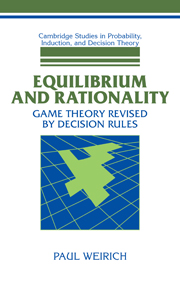5 - Strategic Equilibrium
Published online by Cambridge University Press: 18 March 2010
Summary
This chapter uses our new account of self-support to obtain a new account of equilibrium in games. It introduces strategic equilibria and shows that all of the games we treat have one.
A strategy is self-supporting if and only if given its realization there is no sufficient reason to switch. Hence a strategy is self-supporting only if given its realization there is no sufficient incentive to switch. If a strategy avoids this type of self-defeat, we call it strategically self-supporting, and a profile made up of strategies that jointly have this type of self-support we call a strategic equilibrium:
A strategic equilibrium is a profile of strategies that are strategically self-supporting given the profile.
Strategic equilibrium is not equilibrium with respect to all reasons. Principles of equilibrium selection, for instance, may give an agent a sufficient reason to switch from his part in one equilibrium to his part in a better equilibrium even if he does not have a sufficient incentive to switch from his part in the first equilibrium. For simplicity, however, we study only strategic equilibrium. Investigating strategic equilibrium allows us to focus on reasons that can be defined in terms of incentives.
Although strategic equilibrium may ignore some reasons to switch, being a strategic equilibrium is a necessary condition for being an unqualified equilibrium. An unqualified equilibrium is a profile of strategies that are self-supporting given the profile. Thus it is a profile in which every strategy at a minimum is strategically self-supporting given the profile, that is, a profile in which no agent has a sufficient incentive to switch strategy given the profile.
- Type
- Chapter
- Information
- Equilibrium and RationalityGame Theory Revised by Decision Rules, pp. 130 - 158Publisher: Cambridge University PressPrint publication year: 1998



